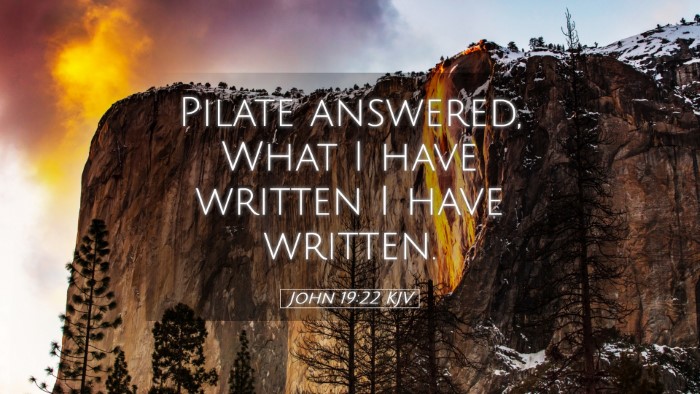John 19:22 - Commentary Summary
Verse: "Pilate answered, What I have written I have written."
Contextual Background
This statement from Pontius Pilate comes at a crucial point in the narrative of Christ's crucifixion. The verse encapsulates the political and judicial tension surrounding the trial of Jesus, as well as the irony of the situation where a Roman governor inadvertently proclaims a profound theological truth.
Pontius Pilate's Role
-
Political Expediency: Throughout the trial, Pilate is depicted as a figure caught between his responsibilities as governor and the rising tide of Jewish dissent. His reluctance to condemn Jesus reflects his awareness of the political ramifications of his decisions.
-
Symbol of Authority: Pilate's declaration about the inscription he wrote represents the authority he wields. Despite his personal ambivalence towards Jesus, Pilate's actions serve to fulfill prophecies and divine plans, showcasing God's sovereignty even in human folly.
Insights from Commentaries
Matthew Henry's Commentary
Henry emphasizes the sovereignty of God in the events surrounding the crucifixion. He notes that Pilate's words, "What I have written I have written," carry a weight that transcends the immediate context. Pilate, unwittingly, contributes to the fulfillment of prophecy concerning Jesus as the King. Henry highlights the idea that what has been declared must stand, regardless of personal or political desires.
Albert Barnes' Notes
Barnes points out that Pilate's inscription, which reads, "Jesus of Nazareth, the King of the Jews," reveals the irony of the situation. The very title that was meant to mock Jesus instead proclaims His true identity. Barnes further elaborates that Pilate's insistence on not changing the sign denotes his desire to assert his authority in a situation where he felt increasingly powerless, illustrating the inner conflict of a ruler caught between justice and expedience.
Adam Clarke's Commentary
Clarke discusses the implications of Pilate's statement in light of Jewish customs and Roman law. He emphasizes that Pilate's decision to resist the Jews’ demands showcases not only his unwillingness to submit to their pressure but also reveals a deeper truth: that Christ's identity will be acknowledged even in His mockery and misery. Clarke's insights remind readers that God’s purpose is unwavering, even when executed through flawed human instruments.
Theological Reflections
The statement made by Pilate serves as a profound reflection on divine sovereignty and human responsibility. It invites theological exploration into how God can sovereignly utilize the decisions made by those who operate in opposition to His will.
-
The Sovereignty of God: This moment reinforces the belief that God orchestrates events to fulfill His plan, even when human agents act in ignorance or malice.
-
The Irony of Kingship: Pilate's mockery of Jesus’ kingship highlights the paradox of Christ's crucifixion, where His true royalty is revealed in suffering and death.
Lessons for Contemporary Readers
This verse encourages contemporary believers to contemplate the implications of authority and the inviolable nature of truth. It speaks powerfully to pastors and theologians about the importance of standing firmly by God's truth, much like Pilate's unwavering declaration, even amidst pressures of cultural conformity.
-
Understanding Authority: Leaders and those in positions of authority must recognize that their decisions have spiritual ramifications that could echo into eternity.
-
Proclaiming the Truth: Christians are called to boldly proclaim the truth in a world that may seek to change or dilute it, reflecting Pilate’s statement as a commitment to clarity and honesty.
Conclusion
John 19:22 offers a profound glimpse into the intersection of divine sovereignty and human decision-making. The finality of Pilate's statement highlights the immutable nature of truth amidst external pressures. As this commentary reflects, there is much for believers to learn about integrity, proclamation, and the overarching plan of God in the face of human opposition.


